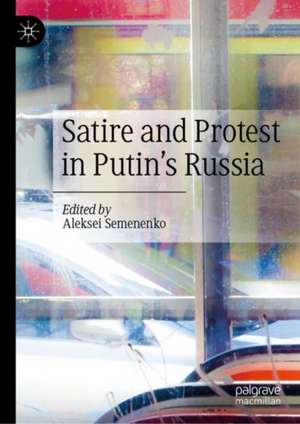Satire and Protest in Putin’s Russia
Editat de Aleksei Semenenkoen Limba Engleză Hardback – 2 dec 2021
| Toate formatele și edițiile | Preț | Express |
|---|---|---|
| Paperback (1) | 885.63 lei 6-8 săpt. | |
| Springer International Publishing – 3 dec 2022 | 885.63 lei 6-8 săpt. | |
| Hardback (1) | 763.02 lei 3-5 săpt. | +19.05 lei 5-11 zile |
| Springer International Publishing – 2 dec 2021 | 763.02 lei 3-5 săpt. | +19.05 lei 5-11 zile |
Preț: 763.02 lei
Preț vechi: 838.49 lei
-9% Nou
Puncte Express: 1145
Preț estimativ în valută:
146.02€ • 151.89$ • 120.55£
146.02€ • 151.89$ • 120.55£
Carte disponibilă
Livrare economică 24 martie-07 aprilie
Livrare express 08-14 martie pentru 29.04 lei
Preluare comenzi: 021 569.72.76
Specificații
ISBN-13: 9783030762780
ISBN-10: 3030762785
Pagini: 454
Ilustrații: XXXIX, 197 p. 14 illus.
Dimensiuni: 148 x 210 x 22 mm
Greutate: 0.41 kg
Ediția:1st ed. 2021
Editura: Springer International Publishing
Colecția Palgrave Macmillan
Locul publicării:Cham, Switzerland
ISBN-10: 3030762785
Pagini: 454
Ilustrații: XXXIX, 197 p. 14 illus.
Dimensiuni: 148 x 210 x 22 mm
Greutate: 0.41 kg
Ediția:1st ed. 2021
Editura: Springer International Publishing
Colecția Palgrave Macmillan
Locul publicării:Cham, Switzerland
Cuprins
Chapter 1. The Evolution of Censorship in Russia.- Chapter 2. The Evolution of Satire in Russia.- Chapter 3. Satire on post-Soviet TV: From “Puppets” to Puppets.- Chapter 4. KVN: A TV Show Larger than Television.- Chapter 5. Joking Apart: Russian Humor of the Digital Era.- Chapter 5. Monstrations’ and 'Shimmering': Absurdist Popular Protests , by Daniel Leiderman.- Chapter 6. Beyond Subversive Affirmation: The New Dissent Art in Russia, by Klavdia Smola.- Chapter 7. The mediality of satirical protest in Putin’s Russia: “Grazhdanin poet”, by Annelie Bachmaier.- Chapter 8. Conservative Imperfection: Satire and New Populism of Leningrad, by Maria Engström.- Epilogue. Beyond Satire, by Aleksei Semenenko.
Recenzii
“In addition to its considerable contribution to scholarship on contemporary Russian culture, Semenenko’s comparative historical discussion makes it a valuable addition to studies of the place of humour and satire in Soviet culture … . This volume also fills a gap in the scholarship on Putin-era culture and cultural politics, which has tended to focus on particular media (literature, film, television, art, music) or genres, rather than on more amorphous, cross-generic and multi-media modes of expression such as satire.” (Seth Graham, Slavonic and East European Review SEER, Vol. 101 (2), January, 2023)
Notă biografică
Aleksei Semenenko is Associate Professor in Russian at Umeå University. He is the author of The Texture of Culture: An Introduction to Yuri Lotman’s Semiotic Theory (2012), Hamlet the Sign: Russian Translations of Hamlet and Literary Canon Formation (2007), Aksenov and the Environs (coedited with Lars Kleberg; 2012) and other works on Russian culture, translation and semiotics.
Textul de pe ultima copertă
This book studies satirical protest in today’s Russia, addressing the complex questions of the limits of allowed humor, the oppressive mechanisms deployed by the State and pro-State agents as well as counterstrategies of cultural resistance. What forms of satirical protest are there? Is there State-sanctioned satire? Can satire be associated with propaganda? How is satire related to myth? Is satirical protest at all effective?—these are some of the questions the authors tackle in this book. The first part presents an overview of the evolution of satire on stage, on the Internet and on television on the background of the changing post-Soviet media landscape in the Putin era. Part Two consists of five studies of satirical protest in music, poetry and public protests.
Aleksei Semenenko is Associate Professor in Russian at Umeå University. He is the author of The Texture of Culture: An Introduction to Yuri Lotman’s Semiotic Theory (2012), Hamlet the Sign: Russian Translations of Hamlet and Literary Canon Formation (2007), Aksenov and the Environs (coedited with Lars Kleberg; 2012) and other works on Russian culture, translation and semiotics.
Caracteristici
Reviews the evolution of satire in the post-Soviet period Examines various forms of satirical protest in today’s Russia Discusses the ambiguity of satire and its relation to critique and protest, but also to censorship and propaganda
